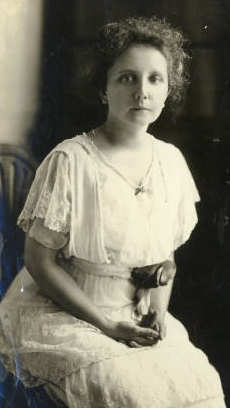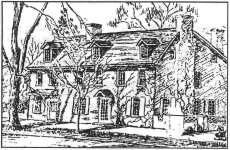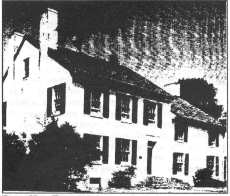Collecting Delaware Books
The Ridgely Letters



Twenty-three bushels of letters were found in a loft of one of Dover's oldest homes in the 1880s. They included the correspondence of three generations of one family between 1742 and 1847. It was another 60 years before the significance of this treasure trove was fully appreciated.
Colonel Henry Ridgely come from Devonshire, England, to what is now Annapolis, Maryland in 1659. His grandson, Nicholas Ridgely, moved to Delaware about 1723. Nicholas built a house at Eden Hill Farm, west of Dover, in 1749. In 1767, he bought a second house, which had been built in 1728, on the Green in Dover. From that day on, the two houses have been connected with the Ridgelys, and the Ridgelys have been part of the cultural, political, economic, and social life of our state.
The letters were discovered in the house on the Green. They moved with various family members for two generations before they were returned in 1938 to the house on the Green. Mabel Lloyd Ridgely, 1872-1962, had then been mistress there for forty years. (Mabel was an active preservationist and suffragist. She had been born in Washington, D.C. About 1898, she married Henry Ridgely, 1869-1940, a noted Delaware jurist and banker.) She would later add other family correspondence that brought the story up to the 1890s. More importantly, she was determined the letters would be preserved and published.
With the help of state archivist Leon deValinger, Jr., they were housed in the Hall of Records in Dover. Mrs. Ridgely then wrote commentary and published a selection letters in a large, handsome book. Finally, she raised money from family members to have abstracts of the complete collection published in three volumes. This last undertaking took more than 20 years.
What Them Befell
What Them Befell, The Ridgelys of Delaware & Their Circle in Colonial & Federal Times: Letters 1751-1890, edited by Mabel Lloyd Ridgely, was printed in 1949 by the Anthoensen Press, Portland, Maine. It includes 21 pages of front matter, 427 pages of text, seven illustrations in the text, and 33 illustrations on unnumbered pages. The book is ten inches high and bound in black cloth with gold stamping on the spine. The dust jacket is in two browns and black.
Copies are common, and no collector should have trouble finding one. Recorded prices run from $20 to $60, depending on condition. Auctioneers seem to take this book lightly, perhaps because of its quaintsy title, which works to the benefit of buyers.
One of the charms of this book is the window it provides into the everyday life of important Delawareans. Mabel Ridgely did for Dover what Elizabeth Montgomery had done for Wilmington, but Ridgely used the words of the participants. Richard S. Rodney, president of the Historical Society of Delaware, said in the book's forward, "Not only has she added greatly to the sum of period knowledge, but she has opened the longsilent lips and brought the actors back to life and allowed them to tell their own stories in their own words."
And words there were. Everyone wrote letters. Spouses wrote to each other when separated by business or family responsibilities. Parents and children away at school exchanged letters. Mothers and married children in distant cities kept in touch. All of them — men, women, and children — were expected to be able to write good letters and to use the skill regularly.
Mabel Ridgely's selection of letters seems, at first, to run heavily to home and family, rather than business and politics. Indeed, the romance of Mary Vining and General Anthony Wayne is covered in great detail. However, a look at the abstracts of the complete collection reveals that responsibility for keeping the mails flowing rested largely with mothers and daughters.
At School
Many of the letters find children at school in such far away places as Newark, Delaware, or Carlisle, Pennsylvania. The children's letters often ask for money, justified with detailed explanations. The parent's letters are full of advice as to what not to do with spare time. In 1796, Ann Ridgely sends her sons at Dickinson College $50 each for expenses, and cautions them to spend their vacation " … in Manly exercises among proper companions, but not at Taverns let the company be who they may, nor among Woman and Girls, from whom nothing but nonsense and affectation is generally met with nowadays."
About the same time, big sister Williamina wrote the boys, "Well … the Waist Coats are at length done, and I hope they will suit you. Mamma drew the patterns for them both, and very different they are. If you recollect you both requested they might be so … . Mr. Barry made them in the newest fashion."
For three generations, Ridgely parents made a habit of including a misspelled word in letters to children. The son or daughter was expected to identify the error in the reply.
Serious Matters
Life was not easy in those days. Death was common and disease was a constant threat. The capture of a family member by Tripoli pirates and the death of another at sea are reflected in somber letters. Dover is spoken of as unhealthful, as were most other cities. Quinine, sometimes just called "bark," was bought in quantity.
But life went on. Nicholas Ridgely's mother died and his father remarried. As a young man he had occasion to write tenderly to his stepmother, "Honored Madam, I embrace this opportunity of congratulating you on the birth of another daughter, and I hope, by this time, on your recovery. I suppose now Master George must give place to Miss Nancy, and be esteemed in the second degree as he is not now the youngest. I like the name you have given her very much … ."
But many letters are about mundane details of town and farm life. In 1805, for example, Mary Ridgely took over management of Eden Hill Farm while her mother stayed with a sick sister in Germantown, Pennsylvania. Mary had an inventory of the farm's granaries made, and recommended to her mother how much of the wheat and com should be sold for cash, used for seed, used as feed, and milled into flour for the kitchen. She also reported on negotiations to rent her mother's Duck Creek farm.
Another letter reports the "news from Dover," including the engagements and weddings. It goes on to report on a ball. "I never enjoyed myself so much in my life. We had seven sets on the floor at once, and the greatest good humour and harmony, every body pleased."
Calendar of Letters
The abstracts of the collection of letters contain many more business details and reports of household management. These abstracts were published in three volumes printed separately in 1948, 1951, and 1961 as A Calendar of Ridgely Family Letters 1742-1899 in the Delaware State Archives edited by Leon deValinger, Jr. and Virginia E. Shaw. Printing was done by the Milford Chronicle in editions limited to 300 copies. The prospectus for volume III (1961) states that a few copies of the first two volumes were still available.
Because they were printed a different times, it is not quite accurate to speak of sets. However, the binding and printing are quite uniform. Auction prices for sets range from $30 to $100.
Henry Moore Ridgely served as congressman from Delaware through the War of 1812, a period covered in volume II of the Calendar. A letter describing the three-day trip to Washington in January 1812 says in the calendar's abstract style, "Reaching the Susquehannah [River] after nightfall, they learned the boat was icebound on the opposite shore, so they ventured to cross on a rude sled drawn at a run by a young guide. By lantern light he picked their way over the dangerous ice without mishap, though they sometimes thought they heard it cracking beneath them, and were forced to walk when they approached the pier. They reached Baltimore about four the next morning."
In Washington, he paid $10 a week for his room, wood and candles included. Midst criticism of President Madison and the opposition party, he writes to his 25-year-old wife, Sally, in Dover, that she should use her judgement in ordering pork and having the doors painted. A few weeks later she reports buying "19 hundred weight" of pork at $7 per hundred. She also describes problems getting velvet for a bonnet and having to have homespun "sent up by stage."
Some books are meant to be collected as precious objects. Others are meant to be read. Reading the Ridgely family letters will immerse you in the life of our state and its capital two centuries ago.
Notes & 2006 Update
The Ridgely House on the Green can be found on the Green in Dover, directly opposite the old Kent County court house. Eden Hill Farm was a few hundred feet off the south side of the road at the west end of Dover's North Street. On weekdays in summer, produce was sold there. In July 2005, the Delaware State News reported that the 272-acre farm would be extensively developed for residential and commercial uses but that the state had bought 30 acres to preserve the historic house.
2010 Update
See the Dover Post article Justice Ridgely to reclaim ancestral Eden Hill mansion for new information.